The wage gap: why Floridians can't afford Florida
"Atypical wage gap stubbornly persisted ..." is the Groundhog Day of economic news in America's least affordable state, where power hates paying people to work more than it pretends to hate "woke."
This post isn’t that long; but it has a number of images in it. That may cause email to truncate the post. I would recommend clicking through to the site and/or getting the Substack app, which makes for very easy reading.
I truly do not understand why Aspirational Dictator Ron DeSantis allows the Florida Legislature’s Office of Economic and Demographic Research to exist. But man, they do some subversive, droll stuff.
What follows is a sequence of the EDR’s yearly ritual of documenting how much less the average (not even median, which would be worse) Floridian earns for work than the average American. Note the language on the headers. You can find all these annual “Florida Economic Overviews” here. They are incredibly useful sources of information. Read them before DeSantis shuts them down.
2012 seems to be the first year EDR identified the “wage gap” as a Florida problem and made a slide out of it. But the “wage gap” itself, as well as its acceleration, far predates this sequence of slides.
Also, don’t be confused: that red line is not the “national average” wage. It is 89 percent of the national average wage, which is the average of Florida’s “wage gap” over the years. At no point in recent memory has Florida’s average wage sniffed America’s.
This particular sequence shows that average Floridians, who truly call Florida home, have gotten poorer and poorer when compared to average Americans throughout the Rick Scott and DeSantis era. That’s before we even start talking about housing costs.
By the way, Free State of Florida, from here down is where the Trump/GOP dominance of federal economic policy begins. Not so great for your average Floridian. Let’s gooooooo.
We don’t have 2021 yet.
I would love to know the backstory on the actual human being at EDR who decided to insert “stubbornly persisted” into the headers in 2019 and 2020.
This economic wonk saw shrinking average wages relative to America as so fundamental to Florida’s state story that he or she anthropomorphized them into having emotions and motivations. That. is. awesome. I salute you, whoever you are. Please email or text me or DM me on Twitter. We’ll keep it on the downlow.
That said, I’m not sure how the Florida “wage gap,” while certainly “stubborn,” can ever be called “atypical.”
You can’t afford Florida unless you’re born here with capital or bring it from somewhere else
Remember: those EDR slides show what you’re paid for your productivity, not the rent you can collect on the capital you own. I’ll do a whole piece on the massive difference between capital rent and productive income some other day. But ownership of high value capital is not, at all, a productive meritocracy. It’s almost entirely a question of inheritance and government subsidy.
And for now, understand that Florida’s long-standing, worsening wage gap at a time of surging capital value is why we’re the least affordable housing state in America, even if some states, like California, remain more expensive for now. It’s two-pronged problem.
See one version of the story here. And another here.
Check out this graphic from the second article about the unsustainable housing rent bubble.
Now compare it to the latest wage gap graphic.
What do you notice about those lines of income and expense? Like I said: a two-pronged problem.
Florida’s unaffordability is compounded by the fact that we’re a regressive, high sales tax state, with very poor and limited state services, and a cratering home insurance market driven by climate change. We also have an historically terrible, voucher and grift eroded, public and private state education system. Only heroic local educators backed by local tax referenda keep this state system functioning at all. But we’re at 9,000 teacher vacancies and growing, just in the public system.

Here’s a good reason why:
Starting salary is meaningless because most teachers don’t make it three years. Anytime anyone brags about starting teacher pay, they’re just bragging about onboarding inflation.
But that teacher number is completely consistent with a Florida that has bet everything on becoming a short-term rental paradise for inheritance babies, con-men, and imported/mobile capital — with an increasing lack of resources to support the labor and environmental conditions needed to pamper the capital over even the medium term.
Florida also has an aspirational dictator attacking its largest (and overall low wage) employer over supposed “wokeness” — not the “wage gap.” That attack has extremely unpredictable consequences. It also misses the point entirely.
It all makes for quite the unstable mix for the future.
It will start with squatting, I bet
I wrote in-depth about Florida’s historically strange economic model last year, pegged to last year’s overview from the EDR. You can read the article below. It’s among the top 5 most read for Public Enemy Number 1.
I summarized Florida’s reality in one header: “Very, very old; very very low wage; and now very expensive.” I didn’t think this model can sustain itself, I wrote:
I expect Florida to go through wrenching economic and social change in the next 10 years. I’m not sure exactly what form it will take; but elected politics will play only a tiny role, if it plays any role at all. I would compare this period to the Great Migration of exploited, low wage black laborers out of the South to the WWI-born industry of the Northern cities starting in 1915 …
… Florida’s economic and social model is far more different from other states today than it was in the Great Migration era; so we will feel this change more powerfully than will other states. Indeed, this “Great Migration” is going to be Florida-specific, I would say.
Florida’s retirement and tourism industries — the addiction to the imported, perishable capital of the elderly and short-term visitor — has similar business rhythms to agriculture. Indeed, one hears the phrase, “we’re going to grow houses” quite often from former farmers who have sold land to developers.
The imported capital of the elderly, particularly, has to be continually tended, harvested, and replaced by new imported capital. It’s a crop rotation system that depends on Florida being a good enough place to live to keep drawing new crops of migrating elderly.
And yet, we do nothing to maintain our soil.
Cost spikes and capacity shortages don’t market very well once people start to experience them. If you have portable capital, you can find sunshine and beaches — or mountains — in a host of other states when Florida lacks the capacity to service you.
Has anything changed since I wrote that? Just the acute rental cost crisis.
I predict the '“wrenching economic and social change” will start with mass squatting and popping of Florida’s rental cost bubble.
I suspect you will see many people pay deposits on the fiction they can pay these rents over time and then live for free until eviction — then do it over again. This is pretty similar to what happened in the home ownership crash of 2007-08. People stopped paying their mortgages en masse and lived for free as long as they could through foreclosure.
Watch residential rental cash flow to leveraged mass unit, Big Capital owners.
Sorry haters, Florida works beautifully for me. I just want it to work for more Floridians
Periodically, when I point out Florida’s self-destructive grifter pathologies, from education to capital to labor, someone will whine: “Well why don’t you just leave then?”
Why would I do that?
Florida is built for my profile. It’s built for a careful “lib.” (Shhh. Don’t tell anybody.)
Consider these four facts:
I’m mobile “high skill, high wage” remote labor. That’s what being an English major does for you. It means you don’t have to drive to work. It also means I could work anywhere if I wanted to.
I live with very little debt and lots of equity in a comparatively young county in the coolest (not wealthiest) neighborhood of an emerging city. I get core city quality of life without the coastal complications of climate change and the insurance market.
I’m a multi-generation Floridian, born with a home and some capital. For most Floridians, home is somewhere else. For me, it’s inland Florida.
I had no college debt and a little help on my house downpayment in 1999 because of my parents. And like most other comfortable Floridians, I’ve now inherited quite a bit more capital, at least by my modest standards.
Because of these things, I am benefitting in an almost embarrassing way from inflationary pressure on wages, while largely avoiding inflationary costs.
But I’m not typical — from English major on down.
And it’s stupid that power in this state treats most of its citizens as disposable, short-term concerns, just like it does tourists. I hate stupidity, especially wrapped in human cruelty.
So, I regret to inform you, haters, that I’m going to be around, doing what I can to help build a more developmental, sustainable, inclusive Florida from the broken model I’ve been lucky enough to game without cheating or exploiting anybody.
If you’re “stubbornly atypical” about wanting a better Florida — a Florida that is a home for everybody, not a grift for our worst people, let’s work together to build that from the coming ashes.

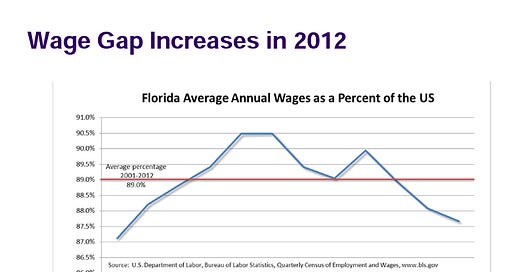




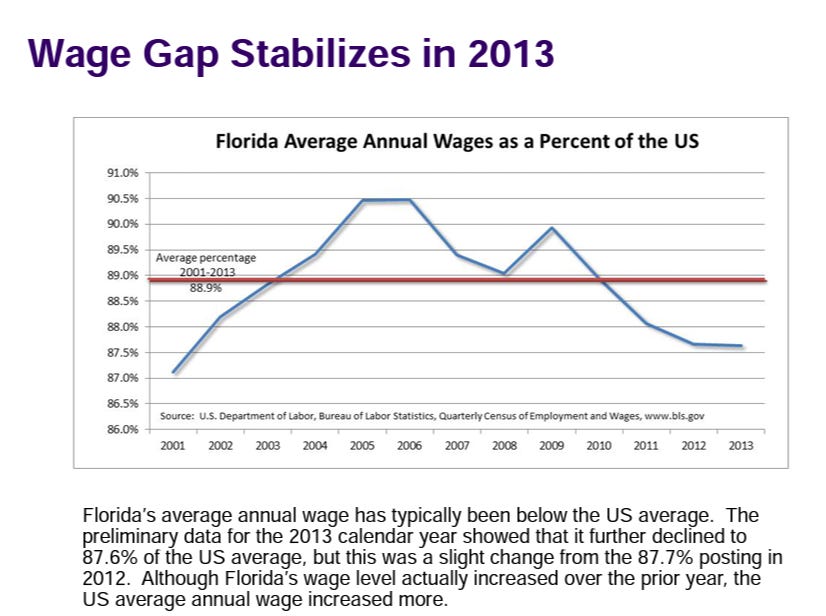


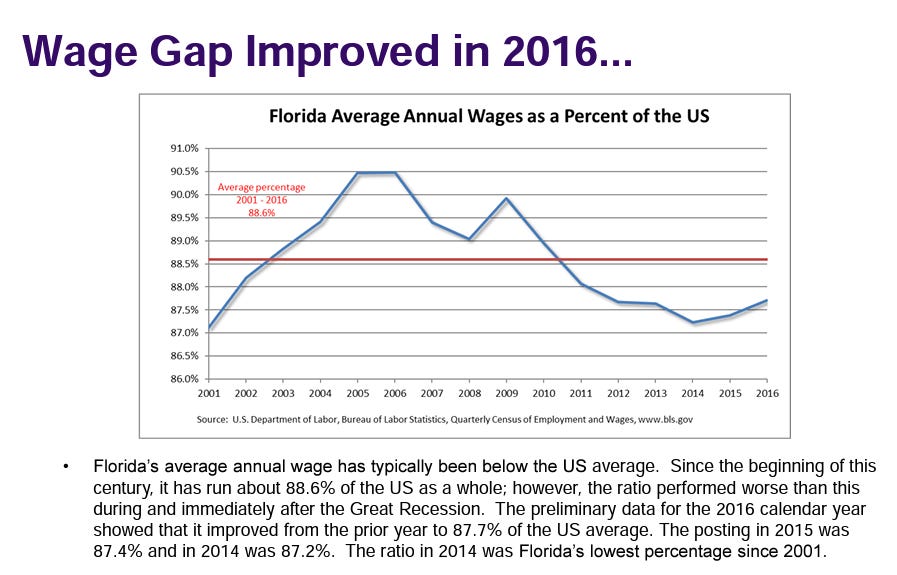
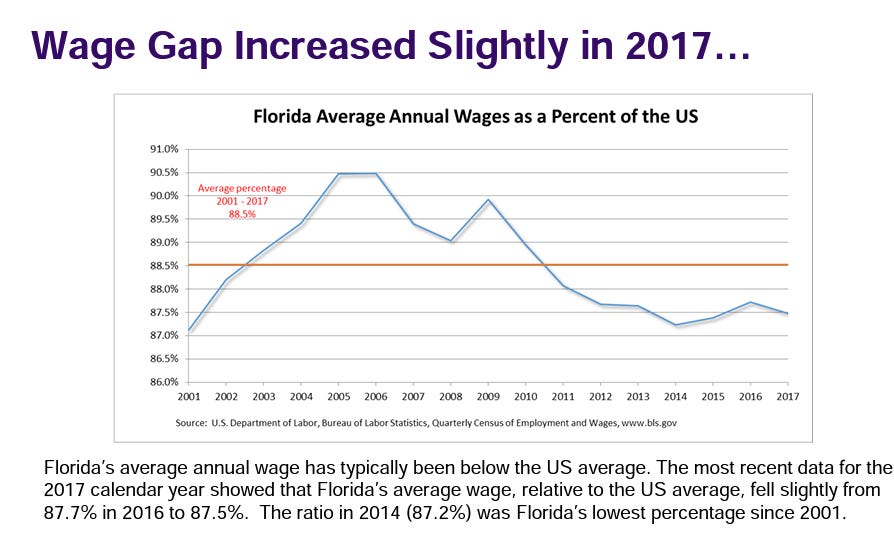
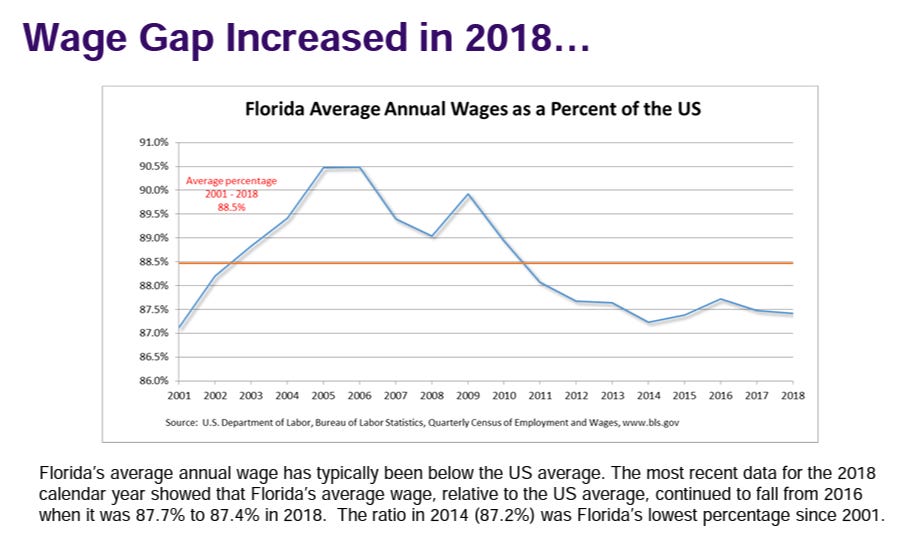
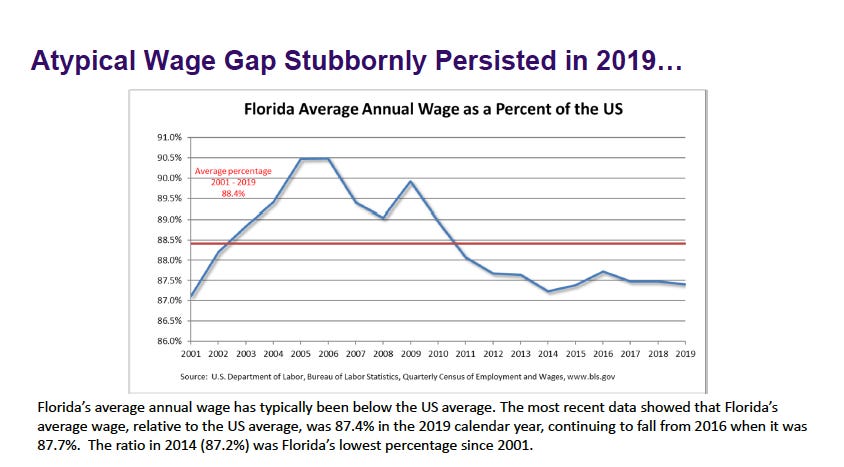
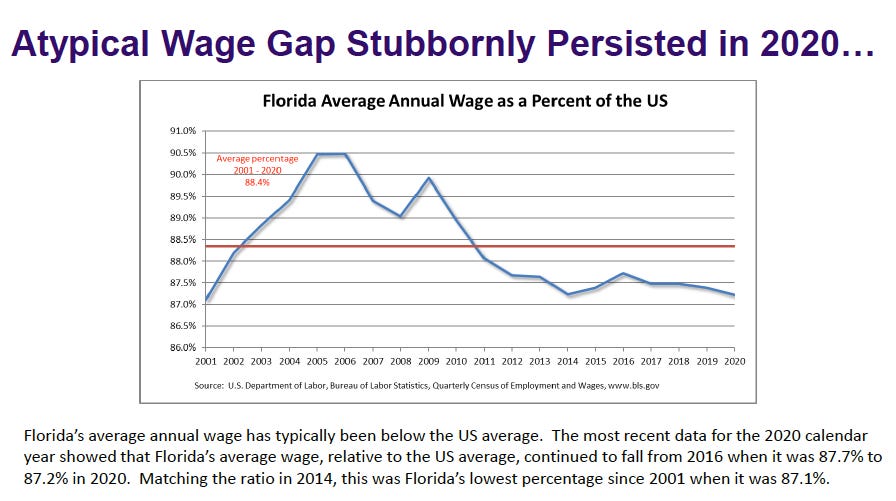
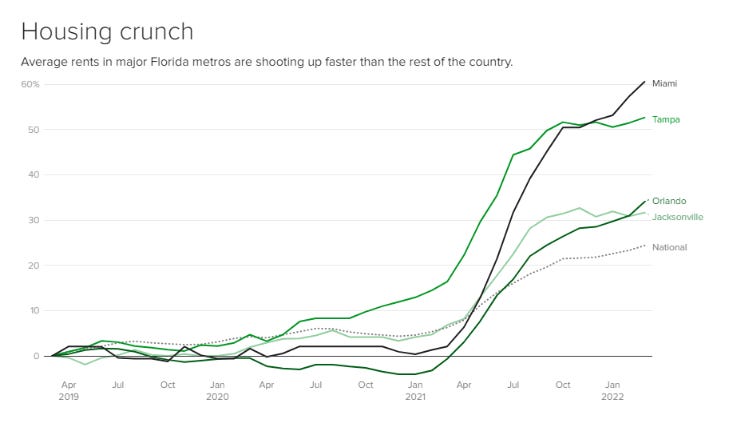


Who moves to Florida? An outsized percentage of retirees. How much to do retirees spend? Next to nothing. Where is Florida? The middle of the US. No, it's down in the lower Southeast. Where transportation costs are high. Florida has always had a problem with low wages. When you have an unlimited supply of labor from folks moving into the state, while the working population is is tied up serving retirees. Trying to lure industry? Our Post-secondary education is pretty good and Improving. Our Primary and secondary continues to lag. Anywhere below Tallahassee has a built in disadvantage for freight competitiveness. We're not Tennessee. All southern states have plenty of something called southerners. And many, like me, place a premium on leisure not money. Many don't. But many do. Give us 5 acres and a mobile home with a big huge shop and we're happy as can be. Is that wrong? I don't know, but it's not changing anytime soon. Last, Florida is nowhere near the most expensive place to live compared to wges. Hawaii takes that by a mile. Most studies put Florida right in the middle. 28-33 Yes, like you I would love to see improvement. That article that declared Florida the most expensive state and then only used statistics from Miami is dishonest trash. I'm just giving you the factors that make it an uphill battle. Not impossible, but uphill. Florida has a long history of boom and bust real estate. When the boom is in full swing, yes, that crimps affordability. And so does the bust. Yeah, you've showed me some reasons to be unhappy with the Governor. None of these politicians are God that's for sure. But that guy from Tallahassee wasn't the answer that the Democrats put up. If the rich people in America start putting up better candidates, then we'll have better government.